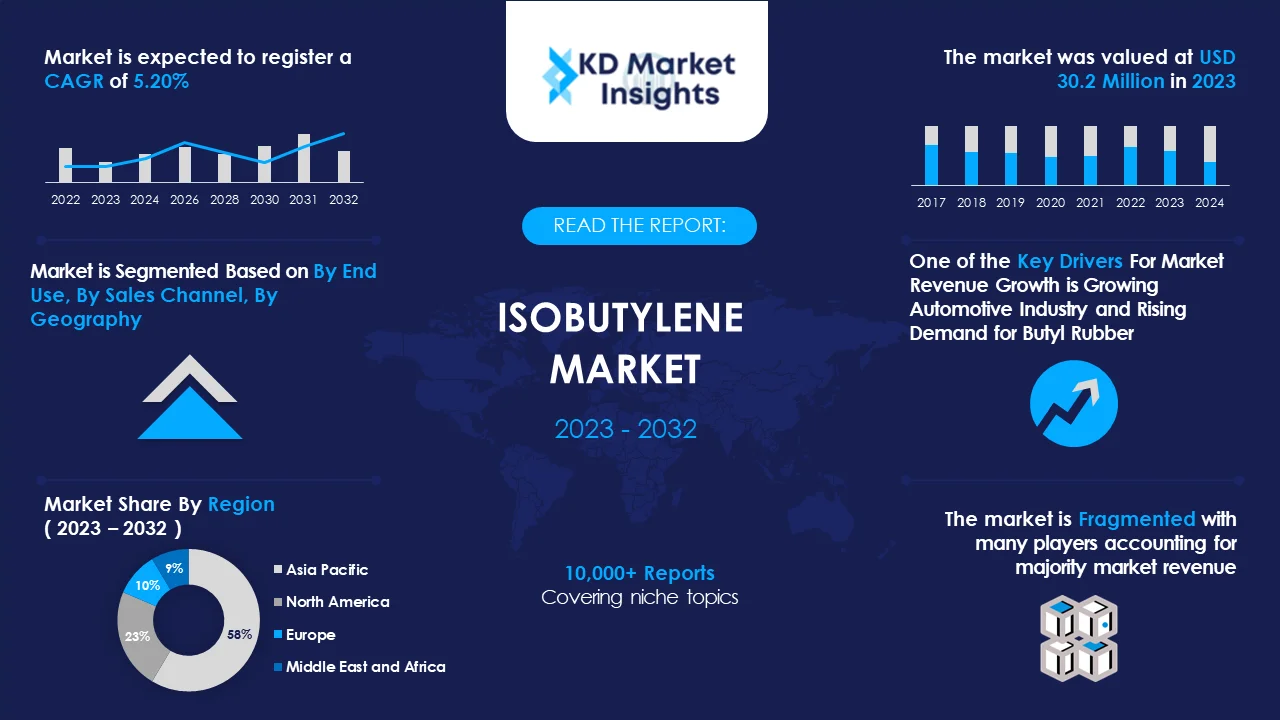Isobutylene Market is segmented by End-Use {Methyl Tert-Butyl Ether (MTBE), Butylated Hydroxy Anisole (BHA), Butyl Rubber & Polyosobutylene (PIBA), Ethyl Tertiary Butyl Ether (ETBE), Butylated Hydroxytoluene (BHT), and Others}; by Sales Channel (Direct Sale, and Indirect Sale); by Region (North America, Europe, Asia Pacific, Latin America, Middle East & Africa) - Global Market Analysis, Trends, Opportunity and Forecast, 2023-2032
Isobutylene Market Overview
The global isobutylene market was valued at USD 30.2 billion in 2023. The market is expected to expand at a CAGR of 5.20% from 2023-2032, and is expected to cross value of USD 45.2 billion by the end of 2032.
Isobutylene is a colorless flammable gas with a molecular formula of C4H8. It is also known as 2-methylpropene. Isobutylene is primarily derived from the petroleum refining process.it is extensively used in the production of various chemicals including butyl rubber, methyl tertiary-butyl rubber (MTBE), and alkylate. The rise in the construction and pharmaceutical industries subsidises the demand for butyl rubber which drives the need for isobutylene. LyondellBasell Industries Holdings B.V., Sumitomo Chemical Co., Ltd., BASF SE., and Honeywell International Inc., are some of the significant parties in the market for Isobutylene.

Get More Insights on This Report - Request Free Sample PDF
Isobutylene Market Drivers
Some key drivers for the isobutylene market are:
- Growing Automotive Industry: With the development of the automotive industry globally, there is a parallel increase in the demand for butyl rubber-based products for tire inner tubes, automotive seals, and other automotive components. Isobutylene, as an essential raw material for butyl rubber production, triggers the growth of the market.
- Rising Demand for Butyl Rubber: Butyl rubber is a major product derived from isobutylene. The increasing need for butyl rubber in various applications such as tire manufacturing, automotive parts, adhesives, and pharmaceutical stoppers is a key driver for the isobutylene market.
- Increasing Urbanization and Infrastructure Development: The infrastructure development and Urbanization projects raise the demand for construction materials and sealants. Butyl rubber, being resistant to heat, weathering, and chemicals, finds extensive use in construction sealants, adhesives, and roofing materials, thereby propelling the demand for isobutylene.
- Expansion of the Chemical Industry: The expansion of the chemical industry, particularly in developing economies, creates opportunities for isobutylene market growth. Isobutylene serves as a versatile building block for various chemicals and derivatives used in a wide range of applications, including plastics, lubricants, antioxidants, and surfactants.
Isobutylene Market Challenges
Some challenges facing the isobutylene market are:
- Unstable Feedstock Prices: Isobutylene production depends heavily on feedstocks such as crude oil and natural gas derivatives. Fluctuations in the prices of these feedstocks can significantly impact the production costs of isobutylene, leading to margin pressures for manufacturers.
- Environmental Regulations: Stringent environmental regulations regarding emissions and pollution control pose challenges for isobutylene producers, especially those involved in the production of derivatives such as methyl tertiary-butyl ether (MTBE). Compliance with environmental standards adds costs and regulatory complexities to production processes.
- Substitution and Alternatives: The availability of alternative materials and substitutes for butyl rubber and other isobutylene-derived products poses a challenge to the isobutylene market. Substitution by synthetic rubbers or alternative fuel additives could reduce demand for isobutylene-based products, impacting market growth.
Isobutylene Market Segmentation
Segmentation of isobutylene market are:
- By End- Use
- Methyl Tert-Butyl Ether (MTBE)
- Butylated Hydroxy Anisole (BHA)
- Butyl Rubber & Polyosobutylene (PIBA)
- Ethyl Tertiary Butyl Ether (ETBE)
- Butylated Hydroxytoluene (BHT)
- Others
- By Sales Channel
- Direct Sale
- Indirect Sale
- By Region
- North America (U.S., and Canada)
- Europe (U.K., Germany, France, Italy, Spain, Russia, Rest of Europe)
- Asia-Pacific (Japan, China, India, Indonesia, Malaysia, Australia, Rest of Asia-Pacific)
- Latin America (Mexico, Argentina, Rest of Latin America)
- Middle East and Africa
Isobutylene Market: Report Scope |
|
|
Base Year |
2023 |
|
Base Year Market Size |
USD 30.2 Million |
|
Forecast Year |
2023-2032 |
|
Forecast Year Market Size |
USD 45.2 Million |
|
CAGR Value |
5.20% |
|
Segmentation |
|
|
Challenges |
|
|
Growth Drivers |
|
Timeline considered for all these studies will be:
2023 – Base Year
2023 – Estimated Year
2023-2032 – Forecast Period
Isobutylene Market Regional Synopsis
In the Asia Pacific region the important growth factor for the isobutylene market is the rapid industrialization and urbanization in this region. Many countries in the Asia Pacific region are investing heavily in infrastructure development projects such as roads, bridges, airports, and buildings. Butyl rubber, known for its excellent sealing and adhesive properties, finds extensive use in construction materials, sealants, and adhesives, thereby fuelling the demand for isobutylene in the region.
In North America there is a growing emphasis on energy efficiency and sustainability, leading to the adoption of cleaner-burning fuels and high-performance materials. Isobutylene-derived products such as methyl tertiary-butyl ether (MTBE) and alkylate are used as fuel additives to enhance octane ratings and reduce emissions, thereafter, driving the demand for isobutylene.
Isobutylene Market Key Players
Some key players in the isobutylene market are:
- ExxonMobil Corporation
- LyondellBasell Industries Holdings B.V.
- Sumitomo Chemical Co., Ltd.
- BASF SE
- Honeywell International Inc.
- KANEKA CORPORATION
- Nizhnekamskneftekhim
- OMV Aktiengesellschaft
- Praxair Technology, Inc.
- Sumitomo Chemical Co., Ltd.
- TPC Group
- Vinati Organics Limited

Need Customized Report for Your Business ?
Utilize the Power of Customized Research Aligned with Your Business Goals
Request for Customized Report- Quick Contact -
- ISO Certified Logo -

















